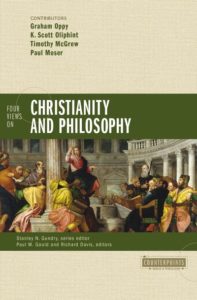Dear EPS friends,
It has been an exciting season for the Evangelical Philosophical Society! We continue to host and sponsor national and regional conferences, mature our web presence through a first-class website, and increase our Philosophia Christi subscription numbers. Please tell your friends, librarians, and colleagues about our first-time subscriber discount. If your library does not yet subscribe to Philosophia Christi, let them know about our discount, which amounts to a $50 savings. More on this below!
EPS Conferences
We are pleased to have regional conferences that continue to do well. I
recently attended the Greer-Heard Forum in New Orleans, which ran concurrently
with an EPS regional conference. As is his custom, our own Bob Stewart pulled
together a superb conference. The Forum’s exchange between Bart Ehrman and Dan
Wallace on textual criticism was highly engaging. (You can check out Ed
Komoszewski’s assessment of the dialogue at his Parchment and Pen blog entitled
"Friday Night
Lights". For the official NOBTS summary of the dialogue, see Gary D. Myers,
"Greer-Heard
08: Top scholars debate reliability of the New Testament at NOBTS forum,"
April 16, 2008..
Next year’s Greer-Heard will feature Harold Netland, a faithful EPS member,
and Paul Knitter on "Religious Pluralism." Last month at Trinity Seminary, both
of them undertook their first round in this genuine religious dialogue-rather
than the all-too-typical lowest-common-denominator version. Harold wrote in an
email, "The exchange was very gracious and irenic, but also pointed and direct.
I think it was good for students to see that two people can disagree radically
on these issues without getting ugly and treating the other inappropriately."
(You can read an edited transcript of their discussion
here.) Such events are just a
sampling of what many EPS philosophers are engaged in throughout the year. May
we prayerfully support and encourage one another in these efforts! And I hope
many of you can make Round Two in New Orleans next year.
This November many of us will be attending the EPS annual meeting in
Providence, RI. It will be good to catch up with you then. EPS vice
president Chad Meister tells me that many fine paper proposals have come in, but
he and his colleagues at Bethel College await word from ETS regarding room
allocations. Bill Craig, who is spearheading the annual apologetics
conference (also in Providence) tells me that plans are moving ahead nicely. (By
the way, Bill Craig and I, who co-edited Passionate Conviction, are now co-editing
the next B&H book taken from our annual apologetics conference-with another
great lineup of contributors, including Charles Taliaferro, Stew Goetz, Bob
Stein, Craig Evans, David Hunt, Victor Reppert, and Mark Linville.) We look
forward to another fine array of speakers at this conference, which will be a
particularly exciting and strategic meeting, as it will be our first in the
fairly unchurched region of New England. Chad Meister has also put together a
wonderful session at this year’s American Academy of Religion conference in
November (Chicago, IL). The topic is on "Religious Diversity." Paul Moser
(Loyola University, Chicago) will present on "Religious Exclusivism" and Keith
Yandell (University of Wisconsin-Madison) will present on "The Diversity of
Religious Experience." The respondent will be by Paul Knitter (Union Theological
Seminary). May God use our efforts there to produce much fruit!
EPS Website & Philosophia Christi Subscriptions
As you all know, our website is looking sharp, attracting more and more
subscribers -wow, have we come a long way! Since October 2007, when our
new website was launched, subscriptions have been steadily rising (1-2 per day).
For our current 10:1 issue (Summer 2008), we are mailing Philosophia Christi to
1400+ subscribers-to over 200 libraries and 1200 to individuals. This represents
a huge jump from just six months ago, and we have every reason to believe these
numbers will continue to increase throughout the rest of the year and beyond.
Having an upgraded, cutting-edge website has directly contributed to a high
renewal rate. Joe Gorra, Scott Smith, Craig Hazen, Lenny Esposito, and
Chad Meister have all labored mightily to make this happen. Our hearty thanks to
them once again! Efforts in marketing (which includes blogging at the
website, promoting among acquisition librarians at the American Library
Association, etc), offering subscription incentives, and improving our
subscription management database have all helped contribute to our growth.
Please help us spread the word about Philosophia Christi and its importance
for library collections, philosophy and theology departments, scholars,
undergraduate and graduate students, pastors, and friends. Please let people
know about our first-time subscriber discount:
$30 = the current issue + 2 year subscription (4 issues).
This extraordinary deal with not be available for long! Take advantage of
this discount by
subscribing here or calling 562-906-4570 (10-5pm, PST).
Let’s continue to pray diligently that as we all "plant" and "water," the
Lord will continue to bring the growth to advance His kingdom. May we
remember that we are co-laborers with God, who can effectively use these
marketing tools and this marvelous technology-but may we not trust in them!
As Craig Gay reminds us in The Way of the (Modern) World, technological advance
not only tends to depersonalize life, but can easily obscure and diminish our
sense of dependence on God. Whether we’re presenting papers, giving
lectures, engaging in debates, writing books, or defending the Christian faith
with a non-Christian friend, let us humbly rely on God in prayer with full,
grateful hearts.
It is a joy to stand together with you all in "the defense and confirmation
of the gospel."
Warmly in Christ,
Paul Copan
EPS President



